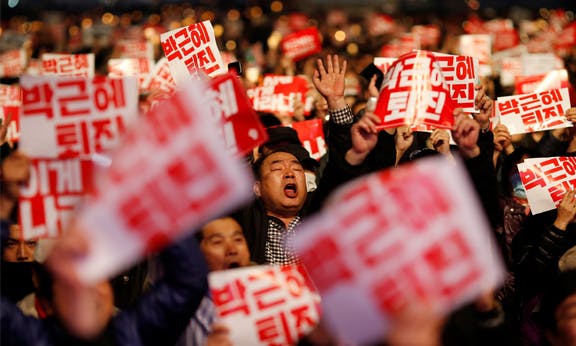South Korea erupts in anti-government protests

More than 200,000 South Koreans took to the streets of Seoul on 5 November to demand the resignation of the country’s president, Park Geun-hye. The event swamped Gwanghwamun Square as protesters chanted, “The owner of this country is the Korean people!” Protests also took place in South Korea’s second and third largest cities, Busan and Daegu.
Large anti-government protests have been taking place for more than 18 months, but recent protests have been fuelled by the revelation that the president’s close confidante of 40 years, Choi Soon-sil, had access to confidential government documents and was acting as a government adviser.
Korean cable television network JTBC revealed on 24 October that it had discovered a tablet PC belong to Choi in an office she had abandoned. It contained presidential briefs for cabinet meetings, appointment schedules for both Park and her aides and 44 presidential speeches, which Choi had edited.
Choi, who holds no official position in Park’s administration and is closely linked to a shamanistic cult, has since been dubbed the “shadow president” by the country’s media. In addition to interfering with government decision making, Choi used her relationship with Park to obtain more than AU$91 million in donations via a variety of foundations, allegedly siphoning off much of the money for personal use.
Despite Park apologising on national television, more than 40,000 people joined a candlelight vigil on 29 October to call for her resignation.
According to an editorial in the South Korean daily Hankyoreh, “Watching these demonstrations felt like witnessing a reoccurrence of the democratisation movement that swept the entire country in 1987 and brought down the dictatorship … [The] rage that had been simmering quietly has boiled over all at once”.
Park and Choi’s crony capitalism appears to have been one offence too many. Since being elected in 2013, Park, who is the daughter of former dictator Park Chung-Hee, has attempted to reintroduce some of the worst aspects of her father’s authoritarian regime, while also attempting to rewrite the history of his dictatorship.
She has used national security laws from 1948 to jail opposition lawmakers and to dissolve the largest social democratic opposition party in the country, while also undermining civil rights, blacklisting political and civil opponents and cracking down on the labour movement and anti-government protests.
In July, Han Sang-gyun, president of the 800,000-strong Korean Confederation of Trade Unions, was sentenced to five years’ jail for organising a series of mass anti-government demonstrations. In the wake of a 130,000-strong mobilisation in November 2015, more than 1,500 unionists, activists and citizens were targeted by state security for participating in the demonstration.
Park’s attempt to introduce new labour laws, which will undermine job security and work conditions, resulted in more than 65,000 workers from the health care, finance and transport sectors walking off their jobs in mid-October – the largest public sector strike in South Korean history.
Park has also been under attack for her handling of the Sewol disaster, in which more than 300 high schools students drowned when a ferry sank in April 2014. Public anger over the bungled rescue operation and the undermining of safety regulations as a result of neoliberal deregulation and government-industry corruption have continued to plague Park.
According to a Korean Gallup poll released on 4 November, her approval rating has now fallen to 5 percent, the lowest ever for any South Korean president. In a bid to save her presidency and government, Park issued a second apology on 4 November after sacking her prime minister, finance minister and public safety minister and at least 10 presidential aides who were linked to Choi.
This did little to placate South Koreans. Instead, it only strengthened and focussed the anti-government sentiment and protests.